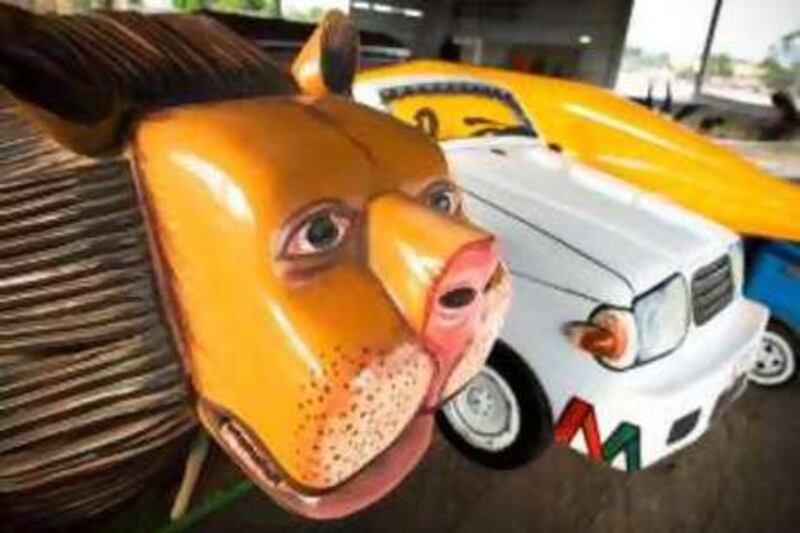TESHIE, GHANA // Being laid to rest inside the belly of a tiger may not be everyone's last request. A lobster or coconut burial might not sound much better and there is no guarantee that you will reach the afterlife faster in a racing car. But for more than 50 years coffin makers in Ghana have been sending people off in style, creating elaborate caskets almost worth dying for. "We can make whatever you like. We've had requests for coffins shaped like cars, giant hens, bags of flour, coconuts and even cocoa beans," said Daniel Oblie, one of several "coffin artists" in the seaside town of Teshie.
Mr Oblie's studio looks more like a zoo than a coffin workshop. Giant zebras, cows, lions and crocodiles are crammed into a wooden pen. Nearby are racing cars, planes emblazoned with airline motifs, oversized hammers, pens and cameras. "My coffins are popular with the Ga people in coastal Ghana," Mr Oblie said as he climbed the rickety stairs that lead to his workshop. "An ideal casket should express the interests, personality and profession of the deceased".
Flight attendants wing their way to heaven in replica aeroplanes, fishermen in giant sardines and wealthy plantation owners in bottles of palm oil. A funeral director might order a hearse. "Each design is custom made and takes about two weeks to make. Because people never know when they will die, they order in advance. Or the relatives come in preparation for the funeral. We take an order every two weeks," Mr Oblie said.
In the dusty workshop, Mr Oblie's carpenters are putting the final touches to a softwood casket in the shape of a tiger. With the skill of sculptors, they carve its huge nostrils, run their hands over its moon-like face and file its canine teeth. A life-size wooden rat is collected from a storeroom and thrust between its jaws. No detail is forgotten. "Tigers are always for village chiefs or important men. It symbolises strength and power," Mr Oblie said.
Throughout West Africa, investing in the dead is as important as taking care of the living. An elaborate funeral is the ultimate status symbol and show of wealth. Ghana's Christians, Muslims and those who adhere to traditional beliefs view funerals as celebratory occasions worthy of more attention and money than weddings. And transport into the afterlife is key. Although not everyone can afford Mr Oblie's fantasy coffins, which cost between US$300 (Dh1,100) and $2,000, the poorest of relatives will scrape together enough funds to pay for a lavish funeral even if it leaves them buried in debt.
"It's interesting work. I never feel sad that the coffins end up buried, you can't think of it that way. They are a vehicle to transport people to the next life just like a real car, plane or boat." Mr Oblie said. There are several coffin artists in Teshie and each lays a claim to the origins of the industry. One suggests it was a tribal king who started the trend, requesting a casket in the shape of a throne. After his funeral orders for similar designs were taken and the tradition continued. Another carpenter said his grandmother, who had never left her village, wanted a coffin shaped like an aeroplane.
Mr Oblie receives regular visits from the fully paid-up to the downright curious, including a few wide-eyed young backpackers. Even those who are not intending to die in the near future can go home with a personalised coffin. They double as sideboards and storage units. With the exception of birds of prey, which are reserved for royalty and state leaders, you can order anything you fancy. Talkative? Your relatives might request a parrot. Former beauty queens order tubes of lipstick. Cobblers ask for shoes and chefs request ovens. As Ghana embraces consumerism, requests for flashy cars and cellphones have shot up.





